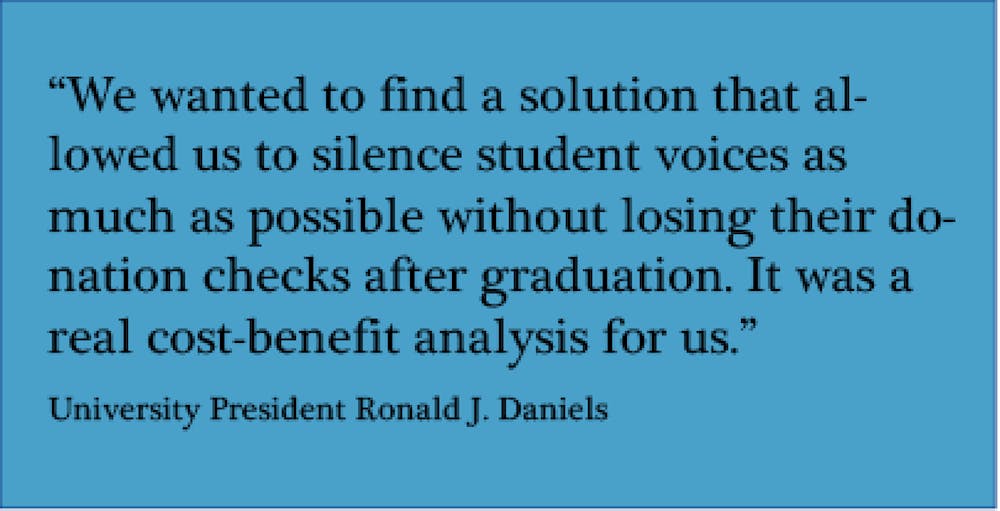APRIL FOOL’S: This article was published as part of The News-Letter’s annual April Fool’s edition, an attempt at adding some humor to a newspaper that is normally very serious about its reporting.
In her final act before flying the nest, former Dean of Student Life Tiffany Sanchez (RIP 2013-2018) released a set of revised “guidelines on free expression” earlier this semester. In response, the leaders of several student activist groups published their own “guidelines on administrative expression.”
When the University released the original guidelines last May, many student groups pointed out that the guidelines were blatantly unconstitutional and violated the basic freedoms of the First Amendment even though they were “voluntary.”
University President Ronald J. Daniels explained that the University realized it had overstepped its boundaries and immediately went into damage control.
“We wanted to find a solution that allowed us to silence student voices as much as possible without losing their donation checks after graduation,” Daniels said. “It was a real cost-benefit analysis for us.”
According to Daniels, the University consulted with several student groups before releasing the revised guidelines. However, if that consultation looked anything like their conversations with community members regarding the new police force, they probably haven’t started yet.
Senior Cole Thermal, the president of fossil fuel divestment movement Divest It All You Fucking Cowards and one of the signatories on the guidelines for administrative expression, explained why they released these guidelines.
“All of the administrative bullshit in the emails we get is just a massive inconvenience,” Thermal said. “Even bad weather alerts start with five paragraphs about how much Hopkins helps the Baltimore community. And don’t get me started on all those damn emails from Hub crowding my inbox.”
In the guidelines on administrative expression, student activists suggest a limit on the number of times per month the University can use phrases like “Baltimore community,” “Johns,” “peer institutions” and “core values of our institution,” which the document calls “propagandistic mockery.”
The guidelines also suggest: requiring every Hub article to include a Charles Village resident who has been racially profiled by campus security; featuring an update on the University’s pending sexual assault investigations in Today’s Announcements; and limiting official announcements to 10-second segments posted to Daniels’ Snapchat story.
When the University released the original guidelines, they denied that student protests were inconvenient and bad for the University’s image. They insisted that they hoped the guidelines would make campus a safer space for student expression.
The leader of Student Tactical Response Against Private Police, a militia of students opposing the recently proposed private Hopkins police force, said that the guidelines on administrative expression were similarly published out of concern for administrators’ mental and physical health.
They spoke anonymously for fear of retaliation from the elite squadron of agents that secretly patrol Daniels’ house to protect him from being heckled after coming home from the Rec Center.
“Recently, Ronny D has really been spiraling,” they said. “We were worried he might start to really believe that Baltimore citizens actually like Hopkins and all the other nonsense the University says. The last thing we want is for him to go on a tweet storm denouncing the U.S. News & World Report rankings and proclaiming Hopkins ‘Number One Forever.’”
Some students, like senior Sam E. Dyin, explained that the guidelines on student expression were a welcome step in creating safe spaces on campus for what he called “ideological minorities.”
“If Dr. Martin Luther King, Jr. were here today, he would be appalled at the state of free speech on this campus,” he said. “We need to listen to things we don’t agree with. Students should learn that, even if they disagree with the University’s policies, it’s important to listen to administrators so that we can have real diversity of thought.”
Others, like president of Students for Basic Democratic Values in Society, Anne Tifah, respectfully contended with Dyin’s assertion.
“That’s bullshit,” Tifah said. “The University doesn’t care about diversity of thought. The more the students think, the more they might start to disagree with the University, and that will look really bad for our rankings.”
Daniels said that the University isn’t motivated by rankings and just wants to make students happier.
“If students focus on their work and don’t worry about what the administration is doing, then they won’t have anything to be unhappy about,” he said. “Transparency on our part is only going to upset people, and that won’t look good for us.”
Tifah said that while the new guidelines on administrative expression would force the University to be more transparent, they ultimately won’t make a huge difference.
“We already know that the University doesn’t care about what students think about its policies,” she said. “We also know that students aren’t going to look at their loan debt and then donate even more. If the University just does what it wants and students just do what they want and we stay out of each other’s way, then everybody’s happy.”





